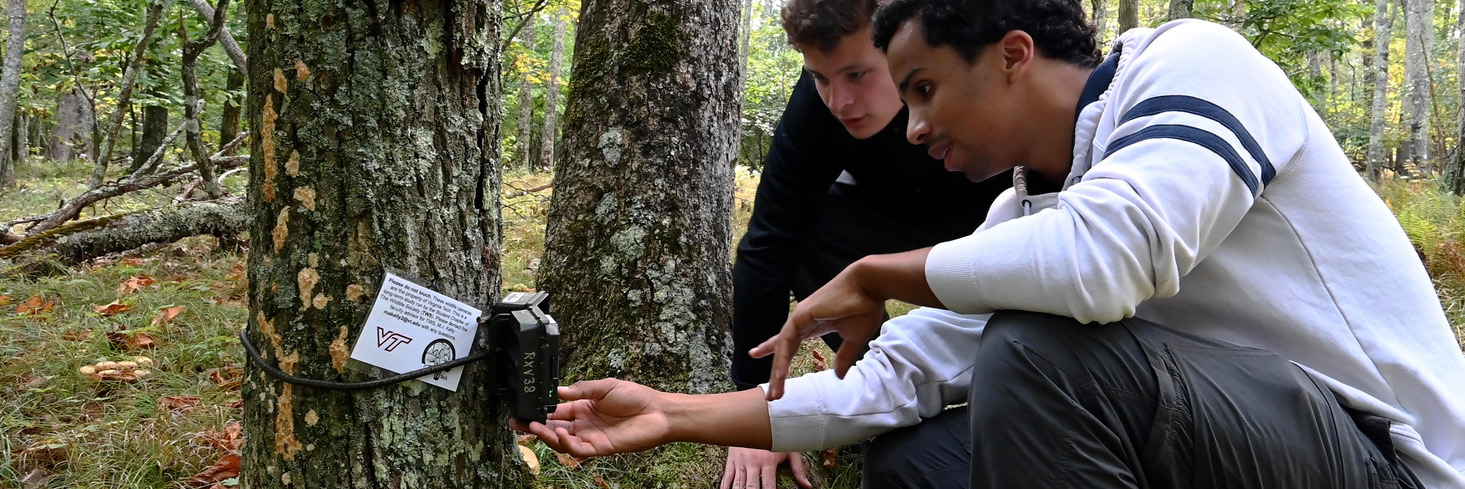Wildlife conservation

What is wildlife conservation?
The wildlife conservation major addresses both the scientific and human elements of ecosystem management. It covers terrestrial species and their habitats, including birds, mammals, reptiles, and amphibians. You’ll study a broad scope of issues, including disease, genetics, human impacts, endangered species, invasive species, and ecosystem management. You’ll graduate prepared to take an active role in finding new and better ways to conserve, use, and sustain the world’s vital wildlife resources. This is a very research-intensive major and provides excellent preparation for graduate school.
Learn more about this major and the Department of Fish and Wildlife Conservation.
What will I learn in this major?
Students majoring in wildlife conservation take courses in the following core areas: natural resources and environment, population dynamics, human dimensions of fisheries and wildlife, evolutionary biology, legal foundations, public speaking and writing, chemistry, and statistics. Additional major coursework is also required in wildlife biology, wildlife field biology, conservation, wildlife habitat, genetics, geographic information systems (GIS), ecology, biology, and physical science.
A snapshot of native wildlife research
02:12
Why study wildlife conservation at Virginia Tech?
- Our Department of Fish and Wildlife Conservation is one of the premier programs in the U.S. that focuses on fish and wildlife research, conservation, and management.
- Classes like Wildlife Field Biology and Wildlife Field Techniques will take you into the field, where you’ll gain experience observing and collecting local wildlife, reporting field data, and using equipment such as bird nets, camera traps, and dart guns. Watch a video of wildlife conservation students in action at the Mountain Lake Biological Station.
- Internships are highly recommended and are a great way to obtain experience and try out careers. Watch our internship videos and see a wildlife conservation major release a rehabilitated hawk.
- Student research opportunities are available in Virginia and neighboring states. Projects have also taken students to Mexico, Belize, Brazil, Indonesia, Botswana, Ghana, and Madagascar.
- All majors complete the Conservation Biology capstone course, which involves applying a complete skillset while working on real-time field projects. Past projects have included using drones to map erosion impacts, monitoring and studying GPS data for Virginia’s elk population, and surveying invertebrates to determine the health of Stroubles Creek.
- You’ll learn from faculty like Kevin Hamed, who leads his students outdoors to search for flying squirrels and practice with acoustic detectors to hear bats feeding, and Marcella Kelly, whose research focuses on large carnivores like ocelots and black bears.
- Students can pursue an option in human dimensions and learn about the human considerations that may be the cause or cure for conservation challenges and threats to fish and wildlife populations.
- There are ample opportunities for outreach in the local community. Senior wildlife conservation capstone students have worked with the Humble Hustle Company, a nonprofit organization that empowers Black youth and connects diverse communities, to encourage students to consider careers in conservation.
- You might be interested in a CNRE or integrated Pathways minor that will provide you with additional subject matter expertise, allow you to pursue a passion, and help you stand out in the job market.
- Student organizations such as the Wildlife Society Student Chapter and the Natural History Collections Club provide opportunities to make connections and get involved on campus and in the community.
What can I do with a degree in wildlife conservation?
Graduates in wildlife conservation may enter the job market or pursue a graduate degree in the field. Career possibilities are listed below, and potential employers include the Environmental Protection Agency, U.S. Fish and Wildlife Service, U.S. Forest Service, National Park Service, state departments of natural resources, state parks, environmental consulting firms, and nonprofit conservation agencies.
- Biological science technician/wildlife technician — Carries out the practical tasks and procedures essential to completing plans and projects: manages habitat, conducts surveys or experiments, and computes and records data.
- Environmental educator/conservation education specialist — Educates learners of all ages about natural resources and the environment.
- Fishing and hunting guide — Leads fishing and hunting trips or expeditions.
- Game warden — Protects wildlife and the environment through law enforcement and conservation activities.
- GIS programmer/computer mapping specialist — Uses computer technology to assist in managing wildlife and other natural resources.
- Public affairs specialist — Works with the news media and the public to provide information about natural resources.
- Urban wildlife specialist/animal damage control specialist — Controls damage caused by wildlife, especially in urban settings.
- Wildlife biologist — Studies the distribution, habitats, life histories, and ecology of birds, mammals, and other wildlife, and plans and carries out conservation and management programs.
- Wildlife/environmental consultant — Sells services and advice to companies, agencies, and individuals on how to manage natural resources for various uses.
- Wildlife refuge manager — Manages national wildlife refuges to protect and conserve migratory and native species of birds, mammals, fish, endangered species, and other wildlife.
- Zookeeper — Cares for animals in zoological parks or aquariums, and enriches the environment of captive animals for conservation, preservation, reproductive research, public education, and recreation.

Attend a CNRE interest session
as part of your campus visit

Apply for admission
if CNRE is your place

Ask questions and connect
with our recruiter, John Gray Williams





